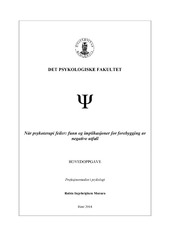Når psykoterapi feiler: funn og implikasjoner for forebygging av negative utfall
Master thesis
Permanent lenke
https://hdl.handle.net/1956/9037Utgivelsesdato
2014-11-24Metadata
Vis full innførselSamlinger
- Faculty of Psychology [527]
Sammendrag
This article explores treatment-related negative effects and their implications for research and clinical practice. Research has documented that between 5-10 % of adult and 14-24 % of child and adolescent clients are worse following treatment. Despite its commonness, psychotherapy research has not paid the same degree of attention to negative outcome as compared to positive psychotherapy effects. Reasons for studying negative outcome are discussed. The field lacks consensus with regard to the definition and measurement of negative effects. Accordingly, this article focuses on defining the concept of negative effects and investigates field-specific methodological issues. Significant findings regarding treatment related negative effects are presented and discussed. This investigation indicates that specific therapist-, client- and process- factors are associated with negative outcome. Evidence points to the potential harm of specific treatments for the majority of clients. In contrast, other treatments only produce negative outcome in a few clients. Finally, several preventive measures are discussed, encompassing the integration of research and clinical practice; education and selection of therapists; and the importance of psychotherapists taking steps to reduce the risk of future negative outcomes. Denne artikkelen utforsker behandlingsrelaterte negative effekter og implikasjonene dette fenomenet har for psykologisk forskning og praksis. Psykoterapiforskning har dokumentert at 5-10 % av voksne og 14-24 % av barn og unge klienter avslutter behandlingen med negativt utfall. Til tross for omfanget har ikke negative klientutfall mottatt samme oppmerksomhet og interesse som studiet av positive psykoterapieffekter. Grunner til å studere negative klientutfall vil bli drøftet. Forskningsfeltet mangler også konsensus om hvordan negative effekter skal defineres og måles. Et fokus rettes derfor på definisjon av negative effekter, og på spesifikke metodologiske utfordringer som er knyttet til feltet. Sentrale forskningsfunn med hensyn til behandlingsrelaterte negative effekter blir presentert og drøftet. Denne undersøkelsen indikerer at bestemte terapeut-, klient-, og prosessfaktorer er assosiert med negative klientutfall. Evidens peker videre mot spesifikke terapiformer som potensielt er skadelig for majoriteten av sine klienter, i kontrast til terapiformer som produserer negative klientutfall for et fåtall. Avslutningsvis drøftes flere forebyggende tiltak med tanke på integrasjon av forskning og klinisk praksis, og utdanning og seleksjon av psykoterapeuter; og betydningen av at psykologprofesjonen tar et ansvar for å redusere risikoen for negative klientutfall.
